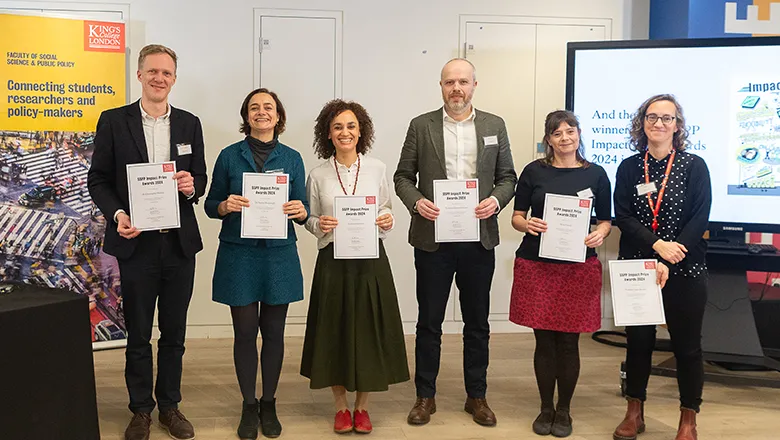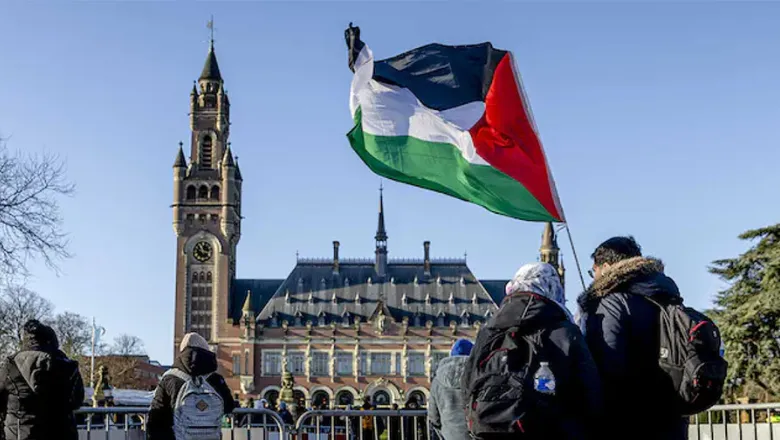
Dr Sophie Haspeslagh
Lecturer in International Relations
Biography
Sophie Haspeslagh is a lecturer in International Relations in the Department of War Studies at King’s College London. Her research lies at the nexus of critical terrorism and security studies and conflict and peace studies. She focuses on the impact of counterterrorism on conflict resolution and the transition of armed actors away from violence. Her most recent work also unpacks the international relations of non-state armed groups.
Sophie was an assistant professor at the American University in Cairo between 2020 and 2022. Previously she was the head of policy at Conciliation Resources until August 2012. She has also worked for various organizations including the International Crisis Group and the United Nations in Algiers, Bogotá, Brussel, London, and Rome. She holds a PhD in international relations from the London School of Economics and Political Science and a Master's in international relations from SAIS Johns Hopkins University.
Sophie has received a number of awards for her research including the BISA L.H.M Ling Outstanding First Book Prize (2022), the Runner-up for the Boulding Award (2019 International Studies Association) and the Global South Doctoral Fieldwork Research Award, LSE (2015). She was the recipient of an LSE School scholarship (2013-2017) and a Fulbright scholarship from the Belgian-American Fulbright Commission (2002-2003).
Research Interests
- Conflict resolution
- (Critical) Security and terrorism
- Negotiations and ediation
- Transition of armed groups
- Foreign policy of non-state actors
- Colombia
- North Africa
Teaching
- Co-director of the Masters in International Conflict Studies
- 7SSWN080 The Global Governance of Conflict and Security: Theories and Methods
- 7SSWN186 International Law and The Use of Force
Publications
Haspeslagh, S. 2021. Proscribing Peace: How listing armed groups as terrorists hurts negotiations, Manchester: Manchester University Press.
Haspeslagh, S and I. W. Zartman. 2022. “The Role of Narratives in Negotiations: The Case of the FARC and Colombia”. In Amrita Narlikar and Fen Hampson (eds), Narratives and Negotiations, Abindon: Routledge.
Haspeslagh, S. 2021. “The ‘linguistic ceasefire’: negotiating in an age of proscription”, Security Dialogue, Volume 52, Issue 4, August 2021, pp. 361–379.
Haspeslagh, S. 2020. “The Mediation Dilemma of (Not) Talking to Terrorists”, Swiss Political Science Review, Vol. 26, pp. 425-445.
Haspeslagh, S. and V. Dudouet. “Conflict resolution practice in conflicts marked by terrorist violence: a scholar-practitioner perspective”. In I. Tellidis and H. Toros (eds.) Researching Terrorism, Peace and Conflict Studies: Interaction, synthesis, and opposition. London and New York: Routledge, pp.103-123.
Haspeslagh, S. 2013.“Listing terrorists”: The Impact of Proscription on Third-Party Efforts to Engage Armed Groups in Peace Processes – a Practitioner’s Perspective”, Critical Studies on Terrorism, Vol.6, No.1, pp.189-208.
Haspeslagh, S. 2020. “Building political will for dialogue: pathways to peace in Colombia”. In Cate Buchanan (ed.) Pioneering peace pathways – Making connections to end violent conflict, Accord 29, London: Conciliation Resources.
Haspeslagh, S. and Z. Yousuf. 2015. Local engagement with armed groups: in the midst of violence. London: Conciliation Resources, Accord Insight 2.
Haspeslagh, S. 2015. “Expert analysis: between fighting and talking”. In S. Haspeslagh and Z. Yousuf (eds.). Local engagement with armed groups: in the midst of violence. London: Conciliation Resources, Accord Insight 2.
Blacklisting’ terrorist groups: the post-9/11 strategy that only serves to prolong wars The Guardian (11 September 2021)
US Terrorist Designation for Houthis is Bad for Yemen Even Beyond Crippling Aid Efforts Just Security (25 January 2021)
Can Colombia’s FARC turn to politics? Open Democracy (16 September 2016)
What next for the peace negotiation between the Colombian government and the FARC? LSE Global South Unit Policy Brief 1/2015
Why criminalise dialogue with terrorists? Open Democracy (22 July 2010)
The Way Forward: What the ‘No’ Vote Means for Peace in Colombia Justice in Conflict (11 October 2016)
Striking the Right Balance: Truth at the Heart of Transitional Justice in Colombia Justice in Conflict (25 September 2015)
Research

Research Centre in International Relations (RCIR)
The Research Centre in International Relations conducts research on practices of security and conflict, their transformation, and their social and political implications.
News
Awards for SSPP research making the world a better place
The Faculty of Social Science & Public Policy (SSPP) held its 2024 Impact Awards to recognise and celebrate impactful research.

Events

Gaza, the ICJ, and the politics of international law
Join Dr Jasmine Gani as she explores the intersection of Gaza, the ICJ, and the politics shaping international law.
Please note: this event has passed.

In the Ruins of Progress: From Sápmi to the Marshall Islands
Join a compelling discussion on wastelanding, ecological catastrophe, and disposability, hosted by the RCIR at King’s College London.
Please note: this event has passed.

Horizons of Peace in Colombia
Discover key insights into Colombia’s peace processes as Congress members, peace delegates, and scholars come together to discuss challenges, achievements,...
Please note: this event has passed.

Armed Actors, Transnational Justice and Peace Diplomacy
Join us for the sixth seminar in the New Voices in Global Security seminar series.
Please note: this event has passed.
Research

Research Centre in International Relations (RCIR)
The Research Centre in International Relations conducts research on practices of security and conflict, their transformation, and their social and political implications.
News
Awards for SSPP research making the world a better place
The Faculty of Social Science & Public Policy (SSPP) held its 2024 Impact Awards to recognise and celebrate impactful research.

Events

Gaza, the ICJ, and the politics of international law
Join Dr Jasmine Gani as she explores the intersection of Gaza, the ICJ, and the politics shaping international law.
Please note: this event has passed.

In the Ruins of Progress: From Sápmi to the Marshall Islands
Join a compelling discussion on wastelanding, ecological catastrophe, and disposability, hosted by the RCIR at King’s College London.
Please note: this event has passed.

Horizons of Peace in Colombia
Discover key insights into Colombia’s peace processes as Congress members, peace delegates, and scholars come together to discuss challenges, achievements,...
Please note: this event has passed.

Armed Actors, Transnational Justice and Peace Diplomacy
Join us for the sixth seminar in the New Voices in Global Security seminar series.
Please note: this event has passed.
